- glencove@wildlifeanimalcontrol.com
Call 24/7 for a free quote:
516-543-6175
Glen Cove Wildlife Animal Control
Professional Wildlife Removal Company Servicing Glen Cove, NY
If you have a problem with wildlife in your Glen Cove home, your best option is to hire a company that specializes in New York wildlife removal only. This is a specialty business, and regular pest control companies do not use the proper techniques to solve animal problems. I have spent many years reviewing New York and Glen Cove, and I recommend the following:
Nassau Wildlife Removal Services
Cell Phone: 516-543-6175
NOTE: If you have a dog or cat problem, call Nassau County Animal Services: 516-676-5913

Nassau Wildlife Removal Services specializes primarily in removing animals from attics of homes and buildings - this includes squirrels in attics, raccoons, and rats or mice in homes. New York also has a documented problem with
bats in buildings, and Nassau Wildlife Removal Services is specially trained in bat removal. They also perform general wildlife trapping services, such as the capture and removal of skunks or opossums on the
property. Call 516-543-6175 to discuss your critter problem and schedule a same-day or next-day appointment. Click here to learn more about what prices we charge in 2020.
When hiring a company to solve your wild animal problem, you want these features:
- Specializes in wildlife removal, not pest control
- Fully New York and Nassau County licensed and insured
- Works 7 days per week (critters don't take weekends off)
- Performs full building inspections: enters and inspects attic
- Performs exclusion repairs, with guarantee against animal re-entry
- Offers cleanup of biohazardous wildlife waste
Nassau Wildlife Removal Services is a full-service Glen Cove wildlife removal company. This is very different from a regular Glen Cove pest control company. The pest control companies spray poison to kill insects. This is not at all
similar to wildlife removal. Nassau Wildlife Removal Services performs a full inspection of the home or property, and determines why the animal(s) are there, and if inside a building, how the animals got inside. All
animals (including rodents) are trapped and removed, or if possible, removed from the building using special exclusion devices. Once the animals are gone, preventative repairs are essential, and
cleanup is sometimes recommended.
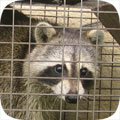 Glen Cove wildlife trapping - it's not as simple as it may seem. It's illegal in New York to trap without a license. Trap type is very important and there are many different types, bait is somewhat relevant, trap placement
is vital, and there are dozens of small things that are very important to know.
Safety is a concern. Then once the animal is trapped, it must be removed and dealt with in the proper manner according to New York law. We offer Glen Cove raccoon removal. Read more about how to get rid of raccoons.
Glen Cove wildlife trapping - it's not as simple as it may seem. It's illegal in New York to trap without a license. Trap type is very important and there are many different types, bait is somewhat relevant, trap placement
is vital, and there are dozens of small things that are very important to know.
Safety is a concern. Then once the animal is trapped, it must be removed and dealt with in the proper manner according to New York law. We offer Glen Cove raccoon removal. Read more about how to get rid of raccoons.
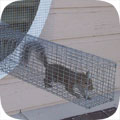 Animals in attics - this is our specialty at Nassau Wildlife Removal Services. Many types of animals like to live in attics. This includes squirrels, raccoons, rats, mice, bats, birds, and even possums. Critters like to go into attics for a safe place to live
and raise their young. Removing animals from attics is very complex work, partly because of the presence of baby animals. If you need Glen Cove squirrel removal, we can remove all the squirrels from your attic, and seal out any future ones. Read more about how to get rid of squirrels.
Animals in attics - this is our specialty at Nassau Wildlife Removal Services. Many types of animals like to live in attics. This includes squirrels, raccoons, rats, mice, bats, birds, and even possums. Critters like to go into attics for a safe place to live
and raise their young. Removing animals from attics is very complex work, partly because of the presence of baby animals. If you need Glen Cove squirrel removal, we can remove all the squirrels from your attic, and seal out any future ones. Read more about how to get rid of squirrels.
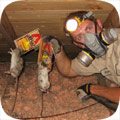 Rodent control must be done in a very specific way. First off, the most important thing is that all the openings that rats and mice can use to enter a house be sealed. Then all the rodents must be physically trapped and removed.
Never, ever use poison! Most Glen Cove exterminators will just use this lazy poison technique to kill rodents, and it causes more harm than good - dead stinky rats, and it doesn't solve the problem. Call us for correct Glen Cove rat removal. Read more about how to get rid of rats.
Rodent control must be done in a very specific way. First off, the most important thing is that all the openings that rats and mice can use to enter a house be sealed. Then all the rodents must be physically trapped and removed.
Never, ever use poison! Most Glen Cove exterminators will just use this lazy poison technique to kill rodents, and it causes more harm than good - dead stinky rats, and it doesn't solve the problem. Call us for correct Glen Cove rat removal. Read more about how to get rid of rats.
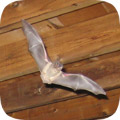 Bat removal is a highly specialized task. New York is known to have colonizing bats who often live in buildings. Bats love attics. If not removed, the colony can grow to a very large size over the years. The bat droppings are often corrosive and
cause health risks. The same goes for bird droppings on or in buildings. We perform Glen Cove pigeon removal and bird control. But our specialty is Glen Cove bat removal. We remove 100% of the bat colony and seal the building so that it's totally bat-proof. Read more about how to get rid of bats.
Bat removal is a highly specialized task. New York is known to have colonizing bats who often live in buildings. Bats love attics. If not removed, the colony can grow to a very large size over the years. The bat droppings are often corrosive and
cause health risks. The same goes for bird droppings on or in buildings. We perform Glen Cove pigeon removal and bird control. But our specialty is Glen Cove bat removal. We remove 100% of the bat colony and seal the building so that it's totally bat-proof. Read more about how to get rid of bats.
 If you have animals inside a house, no job is complete without proper exclusion repairs. If you simply hire a Glen Cove trapper who only removes the critters, then the problem will return. You need to hire a Glen Cove wildlife control company that identifies 100% of the animal entry points
into your building, and seals them shut with professional repairs. In addition, in many cases animals have left waste or contamination behind, and you'll want a company that can provide professional cleaning services. Nassau Wildlife Removal Services does both.
If you have animals inside a house, no job is complete without proper exclusion repairs. If you simply hire a Glen Cove trapper who only removes the critters, then the problem will return. You need to hire a Glen Cove wildlife control company that identifies 100% of the animal entry points
into your building, and seals them shut with professional repairs. In addition, in many cases animals have left waste or contamination behind, and you'll want a company that can provide professional cleaning services. Nassau Wildlife Removal Services does both.
The above are just some of the services offered by Nassau Wildlife Removal Services. We also trap and remove animals that destroy lawns, such as moles, or digging animals. Sometimes animals like opossums will live under buildings, steal pet food, raid garbage cans, etc.
Read about how to get rid of opossums. Skunks commonly live under sheds or decks, and set up a den. We can trap and remove them without them spraying. Read about how to get rid of skunks. Nassau Wildlife Removal Services
also provides dead animal removal in Glen Cove. If you need help with any other wildlife conflict, from a fox, beaver, groundhog, or any other critter, we can solve it. We also do Glen Cove snake removal - most of the snakes in New York are not venomous, but
call us if you want safe removal, or read about how to get rid of snakes in Glen Cove. And remember, we are a private business, not Nassau County Animal Control Services, so if you have a dog or cat problem, call the County at 516-676-5913.
Nassau County animal services does not handle any wildlife issues.
Nassau Wildlife Removal Services: 516-543-6175
Glen Cove Pricing Info For Year 2020
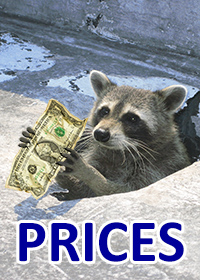 Every wildlife removal situation is different, from the species of animals involved, the location of the animal inside a house or outside, the extent of repairs or cleanup, etc. It's impossible to give one-size-fits-all prices. Examples MIGHT include:
Every wildlife removal situation is different, from the species of animals involved, the location of the animal inside a house or outside, the extent of repairs or cleanup, etc. It's impossible to give one-size-fits-all prices. Examples MIGHT include:
Small Job: For example, a one-stop job to remove an animal in the yard: $100 on up
Medium Job: For example, getting critters out of your house with minor repairs: $300 on up
Large Job: For example, a project involving many service trips and complex work: $500 on up
Give us a phone call now and tell us about your wildlife issue and we will be able to give you a price estimate over the phone. If you're cool with it, we can schedule a same-day or next-day appointment if you like. Our prices are fair, and a good value because we do the job right, the first time.
Glen Cove Wildlife Tip #1:
Some Problems Caused by Armadillo Digging
There is hardly any animal that is as invincible as the armadillo. With regards to managing its presence, the use of a timely measure is crucial. Armadillos don't generally get harmed by deadly traps on account of their durable protective covering, and they rarely seldom consume poison since they are insectivores thus trapping followed by immediate expulsion is the most effective method of getting rid of them. Failure to do this results in a number of devastating effects on household property. Some of them are as follows:
Multiple Emergence of Irregular Holes on the Lawn
The continuous search for food is a normal inclination of the armadillo they are especially attached to soft and level regions, as this enables them to pinpoint the location of their prey. Once they detect the position of organisms like worms or grubs, they will dig out a shallow opening and grab the organism before it can get away. Sadly, gardens are an incredible territory for worms and grubs and different bugs, and in only one night an armadillo can rapidly bore several holes in the yard in pursuit of its prey.
The devastation of Immediate Surrounding of Building Properties
One of the common senses of an armadillo is the impulse to excavate tunnels all over its immediate environment so in cases where a household property is situated in the same area with it, it will definitely begin to dig a tunnel around it. An armadillo will typically create passages and shelter for itself in these zones by continuously digging underground tunnels or expanding existing holes.
Undermining Of Structural Stability
It is not just the incessant excavation of land portions that unpleasant, the aftermath of their irregular excavations around and beneath structures is far more dreadful. This is so because voids left by their excavation under structural elements such as building fences paves way for uneven settlement of those structural elements and this can eventually result in a collapse.
The Armadillo's digging habit indeed leaves a highly negative impact on its surrounding. And quite, unfortunately, all the above-listed effects can happen in just one night as they are very swift and can completely create holes in your garden in pursuit of their meals. While all this is only an attack on your aesthetic senses, repair of the structural damages associated with it can cost you an overwhelming amount of money.
Glen Cove Wildlife Tip #2:
New York Wildlife Information:
New York State State bird: Eastern bluebird
State mammal: Beaver
State amphibian: Wood frog
State fish: Brook trout and striped bass
State insect: 9-spotted ladybug
State reptile: Common snapping turtle
New York, the Empire State, has a diverse population of animals, attributed to the state's variety of landscapes and wide range of temperatures. Not only are there heat-loving animals in New York, like snakes, frogs, and turtles, there are a good number of animals just as oriented to survival in cold weather, like wolves, bear, and deer. Most of these cold-to-warm critters have adaptations not seen in other states. White-tailed deer, for example, will store fat and develop thick coats for the cold season, whereas their cousins in the warmer southern states have no need for such an improvement. If winter is too much for an animal in New York State, it either enters of form of hibernation or it migrates. This is true for the numerous bats, woodchucks, geese, amphibians, and snakes in the area.
People who aren't from New York often associate the state with the large city that shares its name. New York City, though it houses the majority of people in the state, is just a small part of the landscape. Upstate New York, which can be rural or urban, is far larger, and has the bulk of wildlife New York is known for.
Unfortunately, because New York is widely populated with the exception of the Adirondack Mountains, most of the animals in the state have the potential to become nuisances. Residents have their fair share of raccoon, opossum, skunk, and woodchuck invasions every year. Beaver, though not as densely populated as they once were, number in the hundreds of thousands. These creatures are not terribly problematic unless homeowners live near bodies of water that are being flooded or drained due to beaver activity. Some landscape damage from tree-felling is also characteristic of this wood-loving critter. While beaver, skunks, squirrels, and woodchucks aren't predatory to people, there are a number of dangerous wild animals in New York that can become pests. The number one problem predator is the coyote. Because of a population boom, this canine has spread to both urban and rural areas, killing pets and livestock, posing a threat to small children. Coyotes are also common carriers of rabies in the state along with skunks and raccoons.
When it comes to rabies, however, bats are still the number one species for infection in New York. There are thousands of confirmed animal rabies cases in the state every year, and the Department of Environmental Control took to vaccinating the animal population with vaccine-doctored food blocks dropped into the wild by way of helicopter.
You can always call Nassau Wildlife Removal Services, any time of day, at 516-543-6175, for a price quote for Glen Cove wildlife control services. I am confident that this is the best choice amongst wildlife removal companies in Glen Cove, NY.





































